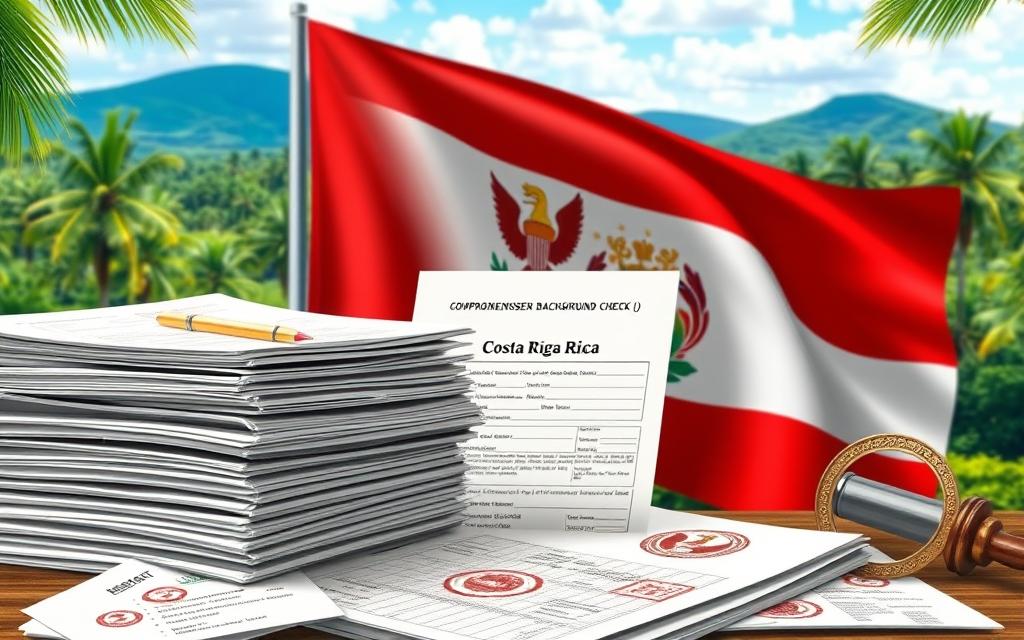Is a Background Check Required for Costa Rica Residency? We Explain

Residency in Costa Rica has become an attractive option for individuals and families seeking a better quality of life. Known for its natural beauty and rich culture, Costa Rica is a desirable destination for those looking to settle permanently or temporarily.
Did you know that applicants with a criminal record may face significant challenges in their residency application? Understanding the residency requirements is crucial, as a criminal record can impact your chances of approval.
We will guide you through the residency application process, focusing on the role of background checks and their evaluation by Costa Rican immigration authorities. Our goal is to help you navigate this process with confidence.
Understanding Costa Rica's Residency Program

Costa Rica has become a hotspot for expatriates seeking a new lifestyle, thanks to its diverse residency options. The country offers a variety of residency programs designed to suit different needs and circumstances, making it an attractive destination for individuals and families alike.
The Appeal of Costa Rica for Expatriates
Costa Rica's unique blend of natural beauty, cultural richness, and modern amenities makes it an appealing choice for expatriates. The country's "Pura Vida" lifestyle, which emphasizes well-being and a connection to nature, is a significant draw for those looking to escape the stresses of urban life. Additionally, Costa Rica's strategic location in Central America makes it an ideal hub for travel and business.
Overview of Residency Benefits and Lifestyle
Obtaining residency in Costa Rica comes with numerous benefits, including access to a high-quality healthcare system, significant tax advantages, and a commitment to education evident in its high literacy rate. Residents can enjoy a relaxed lifestyle, with opportunities to engage in outdoor activities, cultural events, and community integration. The country's stable political climate and strong democratic traditions provide security and peace of mind for expatriates. For more information on whether residency in Costa Rica is worth it, you can visit this resource.
The residency process in Costa Rica is relatively streamlined, typically taking 9 to 12 months. With its permanent residency option, individuals can live indefinitely in the country after meeting specific requirements. This, combined with the country's welcoming attitude towards foreigners and its attractive tax regime, makes Costa Rica an ideal destination for those seeking a new home.
Is a Background Check Required for Costa Rica Residency?

The Costa Rica residency process involves several requirements, including a mandatory background check. This document is crucial for verifying an applicant's criminal history and ensuring they meet the necessary standards for residency.
The Role of Background Checks in the Immigration Process
Background checks play a vital role in Costa Rica's immigration process. They are required for all residency categories, including pensionado, rentista, and investor visas. The verification process typically takes 1-2 weeks, depending on the country of origin. To be valid, these documents must be recent, usually not older than three months, and authenticated by the appropriate authorities. This ensures the information is accurate and up-to-date.
Unlike financial proof, background checks focus solely on the applicant's legal history. Common requirements include police clearance certificates from the applicant's home country. The background check requirement is universal, applying to all residency categories without exception, including pensionado, rentista, investor, and family relation visas.
How Background Checks Impact Your Application Success
Background check results can significantly impact your residency application's chances of success. Statistics show that applicants with criminal records may face up to a 50% reduction in approval rates. Not all criminal offenses are treated equally; certain types are considered more serious and potentially disqualifying by Costa Rican immigration authorities.
Minor offenses, especially those from many years ago, may not necessarily prevent approval. However, full disclosure is essential, as discovered omissions can lead to automatic rejection. Immigration officials evaluate background checks within the context of your complete application, considering factors like the nature and severity of any offenses, time elapsed, and evidence of rehabilitation.
To address potential issues in your criminal history proactively, you can provide documentation of rehabilitation, character references, and legal remedies that might be available. Understanding the timeline for background check processing is also crucial for planning your application, as these documents typically have validity periods of only three months from issuance. For more information on the broader context of Costa Rica residency, you can visit our page on how long it takes to obtain Costa Rica.
Background Check Requirements by Nationality
When applying for Costa Rica residency, understanding the background check requirements based on your nationality is crucial. The process involves obtaining a criminal record certificate from your home country or countries where you've resided, with specific procedures varying significantly.
FBI Background Checks for U.S. Citizens
For U.S. citizens, the FBI background check is a critical document required for Costa Rica residency. To obtain it, applicants must submit a request to the FBI, including fingerprinting, and then authenticate the document through the Apostille process. This step is crucial for ensuring the document's validity in Costa Rica. If you're wondering how to navigate the residency process, understanding the FBI background check process is a good starting point.
Background Check Requirements for Other Nationalities
For non-U.S. citizens, the requirements differ based on their country of origin. For instance, Canadian citizens need to obtain an RCMP criminal record check, while UK citizens require an ACRO Police Certificate. Each country has its own procedure for issuing criminal record certificates, and some may require additional authentication steps. It's essential to research the specific requirements for your country and plan accordingly to avoid delays in your residency application.
The validity period for these criminal record certificates is typically three months from issuance, regardless of nationality. This makes timing crucial in the application process. Applicants who have lived in multiple countries may need to obtain background checks from each country, adding complexity to the process.
Document Authentication and Apostille Process
When applying for Costa Rica residency, understanding the document authentication and apostille process is crucial. This process involves verifying the authenticity of your documents, including your criminal record, to ensure they are valid for use in Costa Rica.
Understanding the Apostille Requirement
The apostille requirement is a critical component of the document authentication process. An apostille is a certification that authenticates the origin of a public document, such as a criminal record or birth certificate. For U.S. citizens, this involves obtaining an FBI background check and submitting it to the U.S. Department of State for apostille authentication.
Filling out the DS-4194 form accurately is essential to prepare your FBI check for Costa Rican authorities. We provide instructions and prompt answers to your questions about the form to ensure each section is complete and accurate.
Step-by-Step Guide to Authenticating Your Background Check
Authenticating your background check involves several steps, starting with obtaining the original document from the appropriate authority in your home country. For U.S. citizens, this means submitting your FBI background check to the U.S. Department of State for apostille. We will guide you through the process, including current fees, processing times, and submission methods.
To avoid common mistakes that can cause delays or rejections, we recommend following our step-by-step guide carefully. Additionally, for documents that require translation, we will explain the proper sequence of steps and requirements for certified translations.
Costa Rica Residency Options and Their Requirements

For those looking to relocate, Costa Rica provides multiple pathways to residency, catering to different needs and circumstances. The country offers a range of options to attract various types of applicants, from retirees to investors and individuals with family ties to Costa Rican citizens or residents.
Pensionado and Rentista Residency
The Pensionado and Rentista residency categories are designed for individuals who can demonstrate a stable income. Pensionados are typically retirees who receive a pension from a qualified source, while Rentistas are individuals with a guaranteed monthly income from a reliable source, such as a pension or rental income. To qualify, applicants must provide proof of income, showing a monthly income that meets the minimum requirement, which is typically set around $1,000 per month for Pensionados. The Rentista category also requires a minimum monthly income, though the specific amount may vary. Both categories require applicants to demonstrate financial stability and undergo background checks.
Inversionista and Family Relation Residency
Costa Rica also offers residency options for investors and individuals with family ties to Costa Rican citizens or residents. The Inversionista category is designed for those who invest in Costa Rican businesses or real estate, with a minimum investment typically ranging between $150,000 to $200,000. Applicants must provide extensive documentation proving the legitimacy and value of their investment. On the other hand, the Family Relation or Vinculo category is for those with close family ties to Costa Rican citizens or permanent residents, including spouses, children, and parents. Applicants in this category must submit relevant documents such as marriage certificates or birth certificates to prove their relationship. Both categories require clean background checks and offer a pathway to temporary residency, which can eventually lead to permanent residency after maintaining the required status for a specified period, typically three years.
Navigating the Residency Application Process

As many expatriates discover, obtaining residency in Costa Rica requires more than just submitting an application; it demands a thorough understanding of the process. Many applicants encounter unexpected hurdles during the residency application process, which can delay or complicate their plans.
Processing Times and Costs
The time it takes to process a residency application in Costa Rica can vary significantly based on the type of residency and the completeness of the application. Generally, applicants can expect the process to take several months. Costs associated with the application include fees for document authentication, translation, and legal services.
Common Challenges and How to Overcome Them
Applicants often face challenges such as incomplete or incorrect documentation, translation issues, and bureaucratic delays. Ensuring that all documents are properly authenticated and translated can prevent delays. Additionally, staying informed about immigration policy changes and seeking professional assistance when needed can help navigate the process more smoothly.
By understanding these potential challenges and preparing accordingly, applicants can improve their chances of a successful residency application in Costa Rica.
Conclusion
Navigating the path to Costa Rica residency is easier when you know what to expect. The process requires attention to detail and proper preparation, from gathering necessary documents to meeting income requirements.
We've confirmed that a background check is a mandatory requirement for all Costa Rica residency applications, serving as a crucial security measure to maintain the integrity of the country's immigration system. Understanding the specific processes for obtaining and authenticating background checks based on your nationality is essential.
Costa Rica offers various residency options, including Pensionado, Rentista, Inversionista, and family relation categories. Each pathway comes with unique benefits, making it easier to find the right fit. With careful planning and the right guidance, achieving residency can be a rewarding experience.
For personalized assistance with your residency application, including background check preparation, contact Costa Rica Immigration Experts today. Let us help you turn your dream of living in this beautiful country into reality. You can reach us at www.jaroscr.com, info@jaroscr.com, or +(506)7182-8969.


